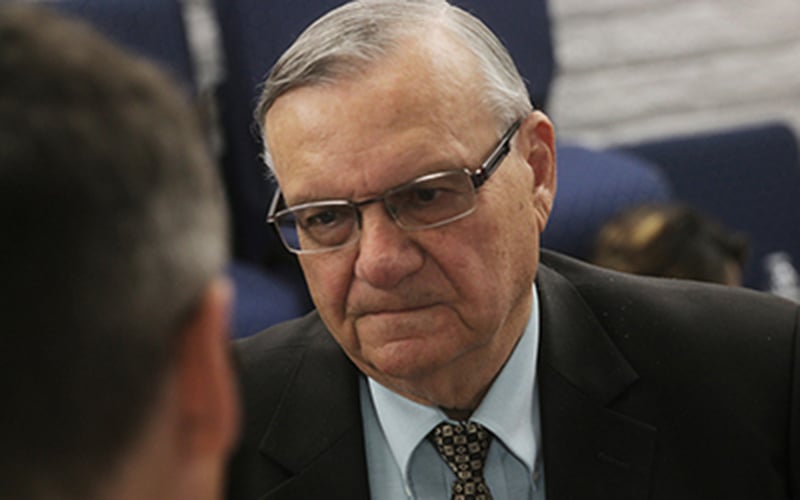
Maricopa County Sheriff Joe Arpaio in a 2016 file photo. A federal court refused to vacate a finding that Arpaio committed criminal contempt from 2017, even after he was pardoned for the offense by President Donald Trump that year. (Photo by Bri Cossavella/Cronkite News)
WASHINGTON – Former Maricopa County Sheriff Joe Arpaio is still guilty of criminal contempt, but that finding cannot be used against him in any future court proceedings, a federal appeals court ruled Thursday.
And Arpaio said he’s OK with that.
“The main thing – the conviction cannot be used in future court proceedings, they can’t bring this up,” Arpaio said. “So, I think when you look at the legal aspects, it’s a win for me.”
For attorneys who fought against Arpaio, however, the bottom line is that he is still guilty.
“That verdict stands,” David Shapiro, an attorney for the MacArthur Justice Center, said in an email. “It remains part of the historical and official record of this disgraced lawman’s crime.”
The ruling by a three-judge panel of the 9th Circuit U.S. Court of Appeals was the latest in Arpaio’s two-year effort to clear his name, after President Donald Trump pardoned him of criminal contempt for his role in racial profiling by his department.
Arpaio, who was sheriff from 1993 through 2016, was sued in 2007 over his department’s policy of racial profiling of Hispanics in Maricopa County. As part of the suit, the department was ordered in 2011 to stop “detaining, holding or arresting” Latinos based on a suspicion that they were in the U.S. without authorization.
The judge in that case later found that Arpaio had intentionally disobeyed that order, and he forwarded a charge of criminal contempt against the sheriff to U.S. District Judge Susan Bolton. She found Arpaio guilty of criminal contempt of court in July 2017 and scheduled sentencing for October.
Before that could happen, Trump granted a full and unconditional pardon on Aug. 25, 2017, to the man who fashioned himself “America’s toughest sheriff.”
Arpaio went back to Bolton, who dismissed the case but said she could not vacate the verdict. She wrote that while Trump’s pardon “undoubtedly spared (Arpaio) from any punishment that might otherwise have been imposed,” it did not “revise the historical facts of this case.”
The 9th Circuit upheld that finding Thursday, but added that Bolton’s “verdict finding Arpaio guilty of criminal contempt has no legal consequences.”
The appeals court’s finding is “exactly what we wanted,” said Arpaio’s attorney, Jack Wilenchik, who said there is no reason for Arpaio to appeal.
While there may be no legal consequences, critics like Rep. Ruben Gallego, D-Phoenix, said there will still be consequences for the former sheriff who is running to regain his office.
“You are still a criminal @RealSheriffJoe and you are going to lose by 10+ points in November,” Gallego tweeted. “Have a good day.”
Arpaio, at 87, is seeking to reclaim his old job from Sheriff Paul Penzone, the Democrat who unseated him in 2016. If elected, it would be Arpaio’s seventh term as sheriff.
In his August election announcement, Arpaio vowed to reopen the Tent City Jail, enforce get-tough jail policies from previous terms and enforce Arizona drug trafficking, sex trafficking and border laws.
“I will continue to stand and fight to do the right thing for Arizona and America, and will never surrender,” his statement said. “Those who break the law will have to deal with this sheriff.”
As for the contempt conviction, Wilenchik said Thursday’s ruling means, “Legally, it’s meaningless. Legally, it’s erased.”
Aditi Juneja – an attorney with Protect Democracy, which filed a friend-of-the-court brief last year urging the circuit court not to vacate Arpaio’s sentence – said the court was correct “not to erase Joe Arpaio’s conviction from his record.”
“He ignored a court order to stop abusing the rights of detainees and the Constitution empowers courts to enforce their orders,” Juneja said in a statement.
“In fact, Mr. Arpaio should never have been pardoned by President Trump for this behavior,” she said. “Presidential pardons are not meant to be used to insulate the president or his allies from accountability.”
